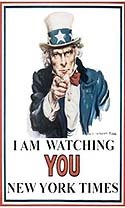FREEDOM OF THE PRESS? You must mean that OTHER America
 "Congress shall make no law respecting an establishment of religion, or prohibiting the free exercise thereof; or abridging the freedom of speech, or of the press; or the right of the people peaceably to assemble, and to petition the government for a redress of grievances." - 1st Amendment, US Constitution
"Congress shall make no law respecting an establishment of religion, or prohibiting the free exercise thereof; or abridging the freedom of speech, or of the press; or the right of the people peaceably to assemble, and to petition the government for a redress of grievances." - 1st Amendment, US ConstitutionLawmaker Wants Papers Probed Over Stories
June 25, 2006
Associated Press
June 25, 2006
Associated Press
WASHINGTON-
The chairman of the House Homeland Security Committee urged the Bush administration on Sunday to seek criminal charges against newspapers that reported on a secret financial-monitoring program used to trace terrorists.
The chairman of the House Homeland Security Committee urged the Bush administration on Sunday to seek criminal charges against newspapers that reported on a secret financial-monitoring program used to trace terrorists.
Rep. Peter King cited The New York Times in particular for publishing a story last week that the Treasury Department was working with the CIA to examine messages within a massive international database of money-transfer records.
King, R-N.Y., said he would write Attorney General Alberto Gonzales urging that the nation's chief law enforcer "begin an investigation and prosecution of The New York Times- the reporters, the editors and the publisher."
"We're at war, and for the Times to release information about secret operations and methods is treasonous," King told The Associated Press.
King's action was not endorsed by the chairman of the Senate Judiciary Committee, GOP Sen. Arlen Specter of Pennsylvania.

King's action was not endorsed by the chairman of the Senate Judiciary Committee, GOP Sen. Arlen Specter of Pennsylvania.
"On the basis of the newspaper article, I think it's premature to call for a prosecution of the New York Times, just like I think it's premature to say that the administration is entirely correct," Specter told "Fox News Sunday."
Stories about the money-monitoring program also appeared last week in The Wall Street Journal and Los Angeles Times. King said he thought investigators should examine those publications, but that the greater focus should be on The New York Times because the paper in December also disclosed a secret domestic wiretapping program. He charged that the paper was "more concerned about a left-wing elitist agenda than it is about the security of the American people."
When the paper chose to publish the story, it quoted the executive editor, Bill Keller, as saying editors had listened closely to the government's arguments for withholding the information, but "remain convinced that the administration's extraordinary access to this vast repository of international financial data, however carefully targeted use of it may be, is a matter of public interest."
After the attacks of Sept. 11, 2001, Treasury officials obtained access to a vast database called Swift _ the Society for Worldwide Interbank Financial Telecommunication. The Belgium-based database handles financial message traffic from thousands of financial institutions in more than 200 countries.
Democrats and civil libertarians are questioning whether the program violated privacy rights.
The service, which routes more than 11 million messages each day, mostly captures information on wire transfers and other methods of moving money in and out of the United States, but it does not execute those transfers.
The service generally does not detect private, individual transactions in the
United States, such as withdrawals from an ATM or bank deposits. It is aimed mostly at international transfers.
Gonzales said last month that he believes journalists can be prosecuted for publishing classified information, citing an obligation to national security. He also said the government would not hesitate to track telephone calls made by reporters as part of a criminal leak investigation, but officials would not do so routinely and randomly.
In recent months, journalists have been called into court to testify as part of investigations into leaks, including the unauthorized disclosure of a CIA operative's name.
He said the First Amendment right of a free press should not be absolute when it comes to national security.


0 Comments:
Post a Comment
<< Home